- 17 mai 2021
- La scène parisienne
- Eléonore Duizabo
Blog mis à jour le 5 août 2025.
De la scène à l'écran : les pièces de théâtre françaises au cinéma
De la scène de théâtre à l'écran, le répertoire français a toujours été une source d'inspiration inépuisable. Mais comment ces œuvres classiques font-elles le saut vers un nouveau médium ?
Vous connaissez sûrement les films Le Dîner de Cons, Le Prénom ou encore La Cage Aux Folles. Mais saviez-vous que tous ces films sont des adaptations de pièces de théâtre françaises ? Dans cet article de blog, vous découvrirez les pièces de théâtre françaises qui se cachent derrière des films cultes !
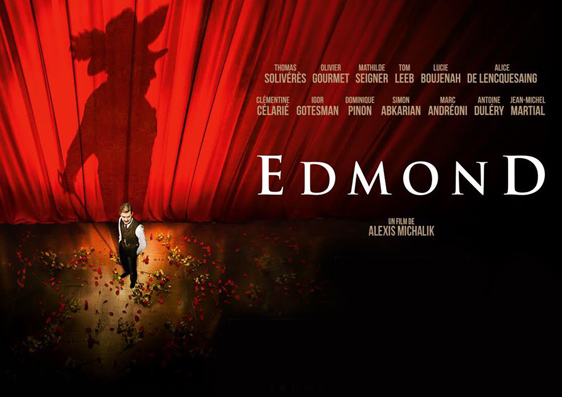
©Legende Films / Gaumont
Edmond – adapté de la pièce éponyme d’Alexis Michalik
C'est après avoir connu un succès triomphal au théâtre du Palais-Royal, qu'Alexis Michalik adapte sa pièce Edmond au cinéma. Nous sommes en 2016 et Alexis Michalik propose sa troisième pièce : Edmond. Il ne faudra que quelques mois pour que la pièce devienne incontournable et que le tout Paris se donne rendez-vous au théâtre pour découvrir le petit chef-d'œuvre d'Alexis Michalik. En 2017, la pièce rafle 5 Molières !
Edmond raconte l'histoire du jeune Edmond Rostand qui se retrouve face à un dilemme. Il n'a pas écrit un vers depuis deux ans et vient de promettre au grand comédien Constant Coquelin un véritable chef-d'œuvre ! Le jeune dramaturge a trois semaines pour écrire une pièce dont il n'a que le titre : Cyrano de Bergerac…
La pièce Edmond est d'abord adaptée en bande dessinée avant qu'Alexis Michalik décide de transposer lui-même son histoire sur le grand écran. Et oui, car, au départ, Alexis Michalik souhaitait directement monter Edmond en film, mais, faute de réalisateur, il avait décidé de retourner à ses habitudes théâtrales. Pour incarner le rôle principal du film, il fait appel à l'un de ses acteurs fétiches, Thomas Solivéres ainsi qu'à Ludivine Sagnier, Tom Leeb, Olivier Gourmet, Lucie Boujenah et Clémentine Célarié. Comme espéré, le film est un succès et ravit la presse comme les spectateurs. Vous pouvez découvrir le spectacle sur scène au Théâtre du Palais-Royal ainsi qu'en bande dessinée et en film !
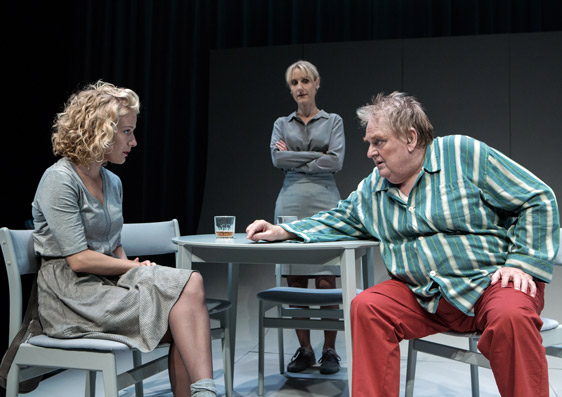
©Thomas Petri - Wikimedia
Le Père – adapté de la pièce de Florian Zeller
Le dramaturge français Florian Zeller a remporté son tout premier Oscar pour son film Le Père — une consécration pour cet auteur dont le talent s’est d’abord exprimé sur les planches. Bien avant de séduire Hollywood, Zeller s’était imposé dans le paysage littéraire et théâtral, salué pour ses romans et surtout pour ses pièces, souvent traduites et jouées à l’international. En quinze ans à peine, il signe dix pièces, toutes remarquées par la critique.
Ses œuvres les plus marquantes, comme La Vérité, Le Père et Le Fils, ont rapidement traversé les frontières : jouées en Angleterre, elles rencontrent un vif succès. À New York, c’est Isabelle Huppert qui incarne le rôle principal dans La Mère. Partout, la presse est unanime : Florian Zeller est l’un des dramaturges contemporains les plus brillants, maître dans l’art de représenter la complexité des liens familiaux et les méandres de l’intime.
Il paraissait donc naturel que Le Père, l’une de ses pièces les plus bouleversantes, soit adaptée au cinéma. Florian Zeller signe lui-même le scénario et la réalisation. Conscient de la force du texte, Anthony Hopkins accepte immédiatement de prêter ses traits au personnage principal, rebaptisé Anthony dans le film, aux côtés d’Olivia Colman et Rufus Sewell.
L’histoire suit un homme de 80 ans, dont la mémoire décline inexorablement. Désorienté, confus, il repousse l’aide que sa fille tente de lui apporter. À travers sa perception troublée, le spectateur découvre une réalité instable, aussi troublante qu’émouvante. The Father est un film d’une grande justesse, qui nous plonge dans l’expérience intime de la perte de repères et de soi. Sorti en mai 2021, le film connaît un immense succès critique et public, couronné par deux Oscars, dont celui du Meilleur acteur pour Anthony Hopkins.
Le Père est la première pièce d’une trilogie qui explore les fractures familiales et psychologiques, aux côtés de La Mère et Le Fils. Bonne nouvelle : Le Fils a lui aussi été porté à l’écran. Et, une fois encore, c’est un casting de premier plan — Hugh Jackman et Laura Dern — qui incarne cette nouvelle adaptation, poursuivant ainsi l’ambition de Florian Zeller : faire rayonner le théâtre au cœur du cinéma.
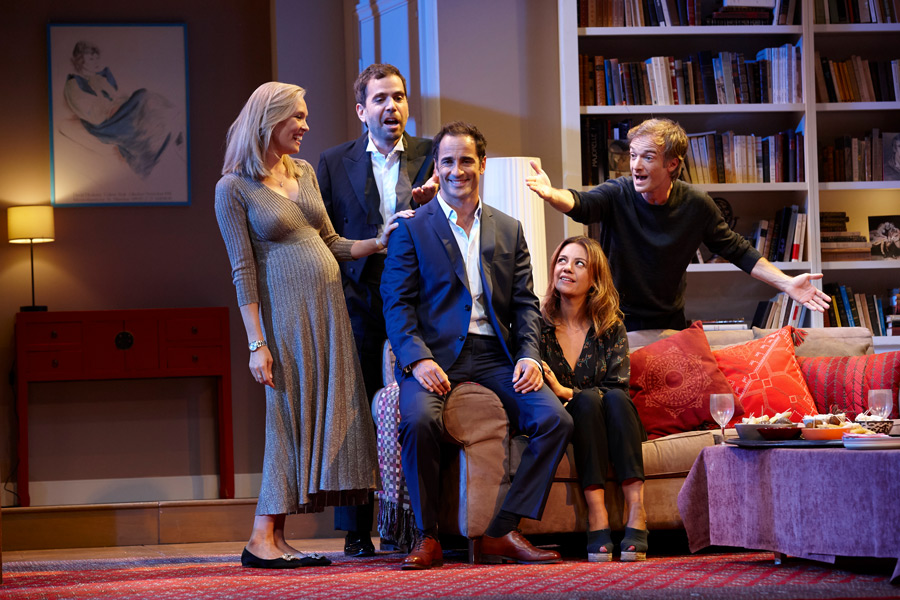
©Bernard Richebé
Le Prénom (Bonjour, c’est mon nom) – adapté d’une pièce primée
Avant le film culte de 2012, il y avait une pièce de théâtre ! En 2010, les dramaturges Alexandre de La Patellière et Matthieu Delaporte présentaient leur pièce Le Prénom sur la scène du Théâtre édouard VII à Paris. Au Théâtre édouard VII, la pièce triomphe et est même reprise en 2018. Et qui pourrait résister à cette comédie parfaitement ficelée où les répliques fusent ?
La pièce suit l'histoire de Pierre, quarante ans et futur papa. Après une longue journée, il a hâte de passer une soirée avec sa famille et des copains. Mais la soirée va devenir un véritable cauchemar lorsque Pierre révèle qu'il souhaite appeler son fils Adolphe. Les langues ne vont pas tarder à se délier et la soirée part en règlement de compte !
Suite au succès de la pièce, les deux dramaturges décident d'adapter leur pièce au cinéma et on ne peut que les remercier. Le film sort au cinéma en 2012 est fait un carton. Les acteurs Valérie Benguigui et Guillaume de Tonquédec remportent même des Césars pour leurs rôles qu'ils avaient créés sur scène deux ans auparavant. Avec plus de 6 millions d'entrées, Le Prénom est devenu une comédie incontournable et en attendant de la revoir sur scène, n'hésitez pas à vous bidonner avec le film !
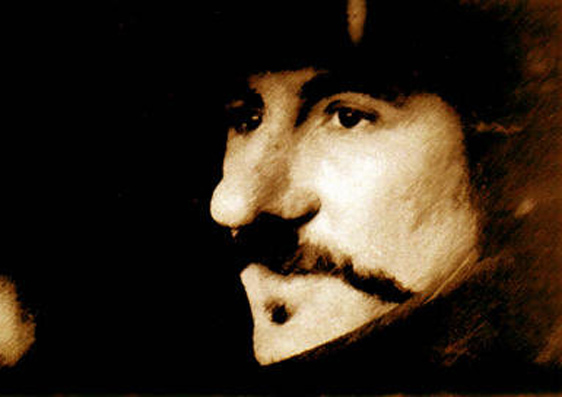
Cyrano de Bergerac – d’après la pièce légendaire d’Edmond Rostand
Vous vous en doutez, derrière le film Cyrano se cache la pièce la plus mythique d'Edmond Rostand : Cyrano de Bergerac. Lorsque Edmond Rostand fait jouer pour la première fois sa pièce en 1897 au Théâtre de la Porte Saint-Martin, il est persuadé que ce sera un échec. Pourtant, le public se rue pour écouter les vers du dramaturge. (Pour tout savoir sur la création de Cyrano de Bergerac, foncez voir la pièce Edmond au Théâtre du Palais-Royal !). À l'issue d'une représentation, le ministre des Finances, Georges Cochery épingle sa propre légion d'honneur sur la poitrine de Rostand en disant « prendre un peu d'avance". Le destin du dramaturge et de sa pièce semblent tout tracés. Cyrano de Bergerac devient et reste l'une des plus grandes pièces du répertoire français.
La pièce conte l'histoire de Cyrano, mousquetaire intrépide et fin poète. Il est amoureux de sa cousine Roxane mais il n'ose lui déclarer sa flemme car elle est si belle et lui si laid, affligé d'un énorme nez : « c'est un cap ? ... c'est une péninsule ! ». Par amour, il accepte d'aider Christian à séduire Roxane. Le triangle amoureux le plus connu du théâtre français a inspiré de nombreuses œuvres et a été maintes fois adapté. L'adaptation la plus connue est sans aucun doute le film de Jean-Paul Rappeneau de 1990. Le personnage éponyme renaît à l'écran grâce à l'interprétation de Gérard Depardieu. C'est la France entière qui redécouvre les vers de Rostand et le film est ovationné, remportant 10 Césars !
Cyrano de Bergerac est une pièce de théâtre intemporelle qui ne cessera jamais de toucher les cœurs de ses spectateurs. Plus récemment, Jean-Philippe Daguerre a mis en scène Cyrano de Bergerac au Théâtre Le Ranelagh. Vous ne pouvez pas manquer cette superbe pièce qui sera bientôt de retour dans le théâtre parisien renommé.
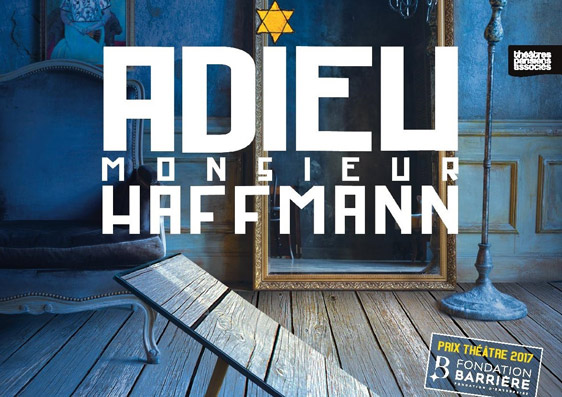
©Pierre & Le Loup / Atelier Théâtre Actuel
Adieu Monsieur Haffmann – adapté de la pièce de Jean-Philippe Daguerre
Le metteur en scène et dramaturge Jean-Philippe Daguerre ne déçoit jamais que ce soit avec ses mises en scène de pièces classiques qu'avec les créations contemporaines de sa compagnie Le Grenier de Babouchka. Sa pièce Adieu Monsieur Haffmann nous le prouve encore une fois ! La pièce remporte quatre Molières en 2018 et a depuis été applaudie dans plusieurs théâtres parisiens ! Jean-Philippe Daguerre mêle tragédie intime et historique dans une pièce saisissante où il faut cacher pour en permettre une autre.
Nous sommes à Paris en 1942 et l'occupation allemande force le joaillier juif Monsieur Haffmann à se cacher. Il demande à son employé, François, de le cacher. François accepte mais à une seule condition : que Monsieur Haffmann fasse à un enfant à sa femme car il est lui-même stérile. Le bijoutier accepte bien que cela ne plaise pas à Blanche, la femme de François. De plus, la situation se complique lorsque les bijoux deviennent très populaires auprès des chefs nazis et que François invite l'ambassadeur d'Allemagne Otto Betz à dîner.
Véritable succès sur scène, c'est le réalisateur Fred Cavayé qui adapte la pièce pour le grand écran. On y retrouvera Daniel Auteuil, Gilles Lellouche et Sara Giraudeau. Le film a été tourné au cœur du quartier Montmartre et a été interrompu à cause de la crise sanitaire. Pendant plusieurs mois, les façades transformées ont plongé tout un pâté de maisons dans les années 1940 !
Le film Adieu Monsieur Haffmann sortira finalement le 12 janvier 2022 au cinéma. Une histoire bouleversante à retrouver dans les salles de cinéma comme sur la scène du Théâtre de l'œuvre.

©Emilie Brouchon
Le Discours – adapté du roman de Fabrice Caro (alias Fabcaro)
Bon d'accord, on triche un peu mais on ne pouvait pas passer à côté du phénomène qu'est Le Discours. En juin 2021, le film Le Discours, réalisé par Laurent Tirard sort au cinéma. On y retrouve Benjamin Lavernhe, Sara Giraudeau, Kyan Khojandi et Julia Platon. Le film n'est basé sur autre que le roman du même nom de Fabcaro. En 2020, le roman a connu une autre adaptation, au théâtre cette fois-ci ! C'est le comédien Simon Astier qui adapte sur scène le roman salué par la critique de Fabcaro. FabCaro est réputé pour ses bandes dessinées. La plus connue, Zaï Zaï Zaï Zaï met tous les critiques d'accord : il est absolument hilarant. Puis en 2018, son premier roman, Le Discours cartonne, suivi deux ans après de Broadway. En 200 pages, il fait le récit d'un quadragénaire un peu perdu, coincé dans un repas de famille. La soirée empire lorsque son beau-frère lui demande d'écrire un discours pour son mariage. Entre flashbacks hilarants et ébauches de discours, Fabcaro porte, à travers le personnage d'Adrien, un regard glacé et intime sur le monde. Mais surtout Fabcaro offre un récit à hurler de rire.
Et rire, c'est justement ce que vous ferez avec la pièce Le Discours, adaptée et interprétée d'une main de maître par Simon Astier. Découvrez Le Discours au Théâtre Michel à partir du 22 septembre 2021. 1 h 35 d'éclats de rire, ça ne se refuse pas !
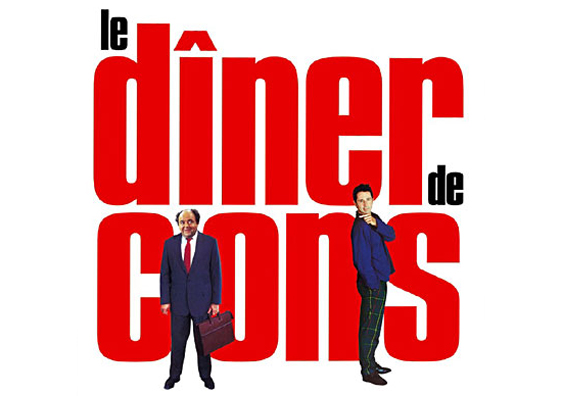
©Gaumont Buena Vista International / Francis Veber / affiche Marc Paufichet
Le Dîner de Cons – adapté de la pièce de Francis Veber
Qui ne connaît pas les répliques « il est mignon Monsieur Pignon, il est méchant Monsieur Brochant » ou encore « C'est fatiguant d'être intelligent » ? Depuis la sortie du film Le Dîner de Cons en 1998, les répliques sont devenues cultes et on se souvient à jamais de Jacques Villeret dans le rôle de François Pignon. Pourtant, avant l'incontournable film, Le Dîner de Cons est avant tout une pièce de théâtre !
En 1993, Francis Veber présente sa pièce Le Dîner de Cons. Franc succès, la pièce restera 3 ans à l'affiche avant de partir en tournée. Depuis, la pièce a été jouée de nombreuses fois dans la capitale. En 1998, le dramaturge décide d'adapter sa pièce au cinéma, toujours avec Villeret dans le rôle de Pignon et Thierry L'Hermite dans le rôle de Brochant.
L'histoire suit Pierre Brochant qui se réunit chaque semaine avec des amis autour d'un principe simple : ils doivent inviter la personne la plus bête possible. En rencontrant François Pignon, qui se passionne pour les constructions de maquettes en allumettes, Brochant se dit qu'il tient la perle rare. Pourtant, les bourdes de Pignon vont transformer sa soirée en désastre. Énorme triomphe au box office et aux Césars, le film est surtout resté gravé dans les mémoires !
C'est grâce à la pièce de théâtre de Francis Veber que l'on rit encore aujourd'hui du délicieux personnage de François Pignon. À quand le retour de cette comédie culte sur scène ?
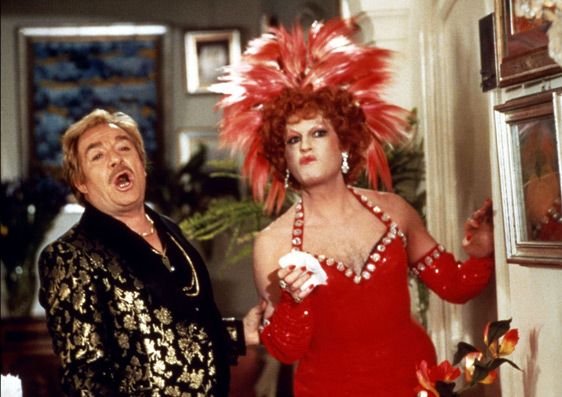
©Archives du 7eme Art/Photo12 - AFP
La Cage aux Folles – adapté de la pièce de Jean Poiret
Voici un autre film d'Édouard Molinaro qui est tiré tout droit d'une pièce de théâtre. Après sa sortie en Franc en 1978, le film connaît un énorme succès commercial et deviendra même le film de langue étrangère le plus vu aux États-Unis ! Le succès ne s'arrête pas là, le film est adapté en comédie musicale en 1993 et c'est dans ce musical extravagant que l'on retrouve l'iconique chanson « I Am What I Am ». Les films La Cage Aux Folles 2 et 3 suivront quelques années plus tard.
Ce succès mondial est expliqué par l'intrigue de la pièce : nous sommes à St Tropez où Albin et Georges tiennent un cabaret de drag queens dont Albin, alias Zaza est la vedette. Leur quotidien est rythmé par les aléas du showbiz et les petites disputes. Georges reçoit la visite de son fils, qu'il a eu d'une précédente union, et ce dernier lui annonce son mariage avec une femme issue d'une famille bourgeoise bien rangée. Albin et Georges mettent en place tout un stratagème pour cacher leurs apparences et se transformer en parents modèles… La soirée s'annonce pleine de rebondissements !
Si l'histoire de La Cage Aux Folles est connue à travers le monde, c'est grâce au talent du dramaturge Jean Poiret. La pièce voit le jour en 1973 au Théâtre du Palais-Royal. C'est Jean Poiret lui-même qui interprète le rôle d'Albin face à Michel Serrault dans le rôle de Georges. Elle reste plus de 5 ans à l'affiche du Palais-Royal avant de déménager au Théâtre des Variétés. Depuis, la pièce a été reprise de nombreuses fois et cette histoire très gaie continue de plaire dans le monde entier.
Si vous ne connaissez pas l'univers de La Cage Aux Folles, nous ne pouvons que vous recommander de voir le film d'Édouard Molinaro, lire la pièce de Jean Poiret, ou écouter l'album de la comédie musicale !
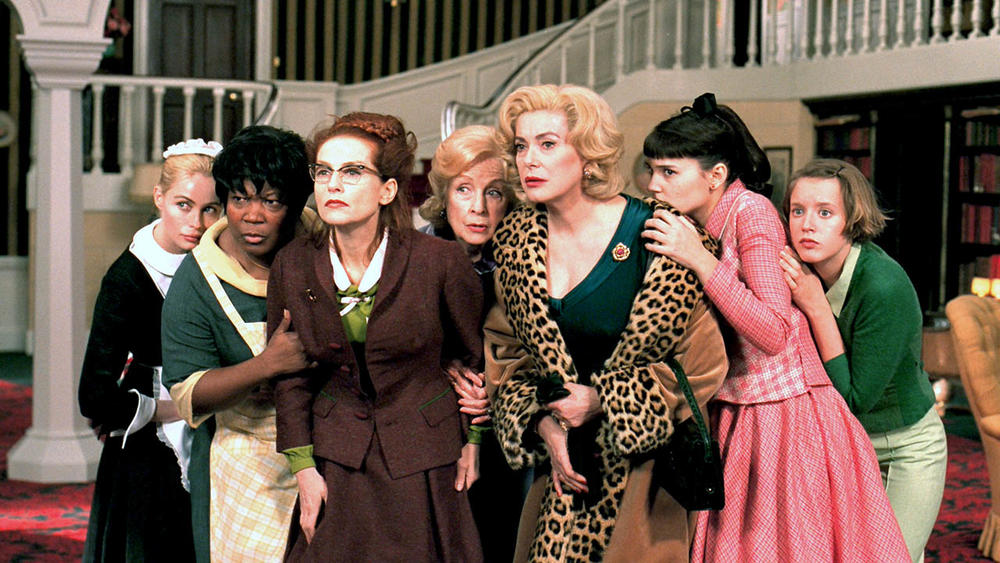
©Studio Canal / Mars Distribution
8 femmes – adapté de la pièce de Robert Thomas
Le film de François Ozon, Huit Femmes est en effet basée sur une pièce de théâtre. Ce n'est autre que l'adaptation de la pièce Huit Femmes de Robert Thomas. La première représentation de la pièce eut lieu au Théâtre Edouard VII en 1961. La pièce est une véritable réussite et remporte même le Prix du Quai des Orfèvres qui récompense les manuscrits de romans et pièces policiers. Puis c'est en 2002 que François Ozon adapte cette comédie dramatique et policière sur le grand écran en y ajoutant quelques chansons !
L'intrigue se situe dans les années 1950 dans une grande demeure bourgeoise où l'on se prépare à fêter Noël. Mais au petit matin, on découvre le père de famille poignardé. Les Huit Femmes présentes ont toutes de bonnes raisons d'être coupables. Pourtant, seulement l'une d'elles a porté le coup fatal. Dans le film de François Ozon, ce sont huit merveilleuses actrices françaises qui donnent vie aux personnages imaginés par Robert Thomas : Danielle Darrieux Catherine Deneuve Isabelle Huppert Emmanuelle Béart Fanny Ardant Virginie Ledoyen Ludivine Sagnier et Firmine Richard. Tout comme dans un jeu de Cluedo, chacune de ces femmes est associée à une couleur, ou plus exactement à une fleur. Dans ce huis clos musical, c'est à travers des chansons de Sheila, Sylvie Vartan et Dalida que l'on découvrira la véritable coupable.
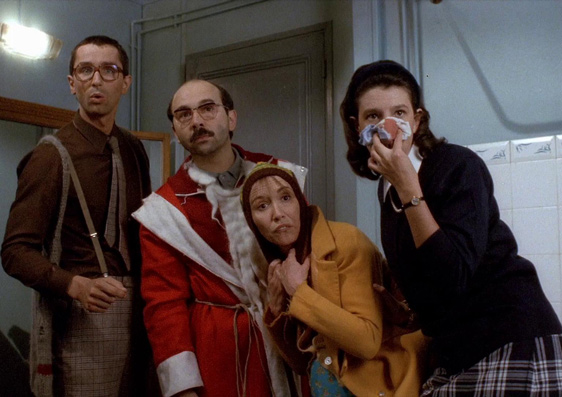
©Jean-Pierre Fizet/Films de Tinacra / Films du Splendid / Archives du 7ème Art
Le Père Noël est une ordure – adapté de la pièce de la troupe du Splendid
Lorsque l'on vous dit Splendid vous pensez sûrement au Théâtre Le Splendid de la rue Saint Martin mais connaissez-vous la troupe du Splendid ? Créée en 1974, elle est composée de Christian Clavier, Gérard Jugnot, Thierry L'Hermite, Michel Blanc, Josiane Balasko, Marie-Anne Chazel et Bruno Moynot. Ils connaissent une grande notoriété grâce aux films Les Bronzés. Mais leur plus gros succès reste Le Père Noël est une Ordure qu'ils jouent en 1979. Le public est tout de suite au rendez-vous et la pièce déménage même au Théâtre de la Gaîté-Montparnasse avant de partir en tournée. C'est le réalisateur Jean-Marie Poiré qui approche la troupe pour adapter la pièce au cinéma. C'est donc sur le grand écran que la France entière découvre l'histoire de deux névrosés assurant la permanence téléphonique de SOS Détresse amitié le soir de Noël. Leur soirée tourne à la catastrophe lorsqu'une femme enceinte, son petit ami déguisé en Père Noël et un travesti débarquent dans leur bureau. Bien que la RATP ait refusé d'afficher les posters du film en raison de son titre provocateur, cela n'empêche pas Le Père Noël est une ordure de cartonner en salles.
C'est surtout grâce à de nombreuses retransmissions télévisées que le film est entré dans la culture française, diffusé notamment pendant les fêtes de Noël. Si l'on espère revoir un jour sur scène les personnages Félix, Josette, Thérèse et Katia, on ne se lasse pas du film et de ses dialogues mythiques.
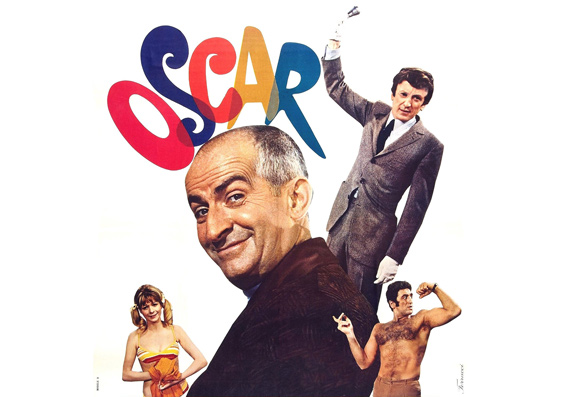
©Gaumont international / Affiche René Ferracci
Oscar – adapté de la pièce de Claude Magnier
Derrière le film archi culte d'Édouard Molinaro se cache une pièce de Claude Magnier. En 1967 a lieu la première représentation d'Oscar au théâtre de l'Athénée où l'on retrouve Jean-Paul Belmondo et Pierre Mondy. Cette comédie débordante est reprise de nombreuses fois dans la capitale. Mais c'est véritablement lorsque Louis de Funès reprend le rôle principal que la pièce triomphe : elle est jouée plus de de 600 fois entre 1959 et 1972 et les improvisations de Louis de Funès deviennent de plus en plus folles ! Il est d'ailleurs rapporté que le Shah d'Iran serait venu plusieurs fois voir la pièce lors de visite à Paris. Le réalisateur Édouard Molinaro décide d'adapter la pièce pour le cinéma et Louis de Funès reprend son rôle fétiche pour le grand écran.
Dans Oscar, il incarne Bertrand Barnier, un riche promoteur qui passe une journée complètement délirante. Son bras droit, Christian, le fait chanter pour obtenir une augmentation afin de demander la main de sa fille avant d'avouer qu'il le vole depuis des années. Les choses se compliquent lorsque la maîtresse de Christian s'avère ne pas être la fille du patron mais qu'en revanche cette dernière est enceinte de l'ancien chauffeur de son père : Oscar ! Entre rebondissements, échanges de valises, tromperie et course poursuite effrénée, Oscar est une des plus grandes comédies françaises sur scène comme à l'écran. D'ailleurs, la pièce a été une autre fois adaptée en film sous le titre de L'Embrouille est dans le sac avec Sylvester Stallone dans le rôle principal. La pièce a été plusieurs fois remontée sur scène, notamment en 2011 où le rôle est réécrit pour Amanda Lear et le titre changé en Lady Oscar.

©Gaumont /LGM Cinéma, Rectangle Productions
Les Garçons et Guillaume, à table ! – adapté du seul-en-scène de Guillaume Gallienne
En 2013, le sociétaire de la Comédie-Française Guillaume Gallienne présente son premier film : Les Garçons et Guillaume, à table !. C'est suite au succès de son one-man-show autobiographique que l'acteur décide de le transposer au cinéma. Le film est un triomphe et remporte 5 Césars dont 4 pour l'acteur. Mais revenons sur la pièce qui a inspiré le long métrage. La pièce Les Garçons et Guillaume, à table ! est présentée en 2008 au Théâtre de l'Ouest Parisien puis au Théâtre de l'Athénée. Dans ce seul en scène, Guillaume Gallienne interprète très habilement tous les personnages. Son talent est récompensé du Molière de la Révélation théâtrale en 2010.
Les Garçons et Guillaume, à table ! conte l'histoire de Guillaume Gallienne : son enfance, sa relation à sa mère qui l'appelait ma chérie, sa sexualité, ses premières amours. Dans le film, Guillaume Gallienne joue son propre rôle à tous les âges ainsi que celui de sa mère. Débordant d'humour et d'intelligence, le film est aussi drôle qu'émouvant. Un film qu'il faut voir à tout prix.
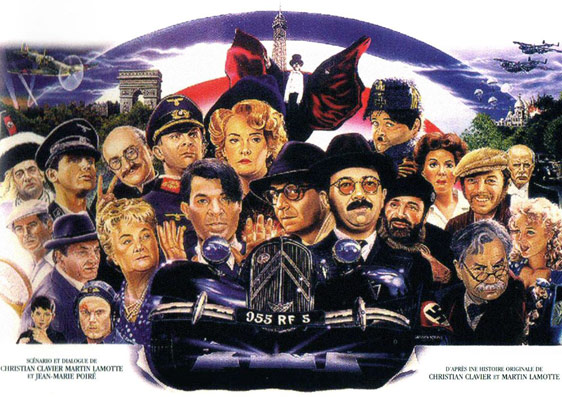
©Studio Canal
Papy fait de la résistance – adapté de la pièce de Christian Clavier et Martin Lamotte
C'est encore une fois Jean-Marie Poiré que l'on retrouve aux commandes d'une adaptation filmique. C'est grâce à ses collaborations avec la troupe du Splendid qu'il se fait connaître du grand public. Et en 1983, le succès est au rendez-vous lorsque Poiré réalise le film Papy fait de la Résistance. Le film n'est autre qu'une adaptation de la pièce du même nom de Christian Clavier et Martin Lamotte.
Sur scène, la pièce est jouée pour la première fois par les acteurs de la troupe du Splendid dans ce même théâtre en 1981. Il ne faudra que peu de temps pour que l'idée d'un film viennent à l'esprit de Christian Clavier qui pense aussitôt à Poiré. Le producteur Christian Fechner réclame un grand nom en tête d'affiche et Louis de Funès est un choix évident. Dès lors que de Funès donne son accord, les artistes se mettent au travail pour adapter leur œuvre. Mais de Funès, censé tenir le rôle du demi-frère de Hitler, meurt au début du projet. Le film lui est dédié car il n'aurait pas vu le jour sans lui. Le film se permet tout de même une distribution cinq étoiles qui regroupe les plus grands acteurs français : Michel Galabru, Roland Giraud, Martin Lamotte et la troupe du Splendid bien sûr.
Ces grands noms du théâtre interprètent l'histoire de la famille Bourdelle qui est prise dans la tourmente de l'Occupation allemande. Leur hôtel particulier est réquisitionné par les nazis et voilà la famille obligée de loger à la cave. Le fils de la famille, Guy Hubert, dissimulé derrière les traits d'un coiffeur efféminé, est en fait Super-Résistant, un héros à cape qui complote contre les nazis.
Cette parodie des films sur l'Occupation est mal reçue par la critique et pourtant, le film est devenu culte ! Pour votre plus grand bonheur, la pièce Papy Fait de la Résistance sera de retour au Théâtre de Paris très prochainement. On y retrouvera Serge Postigo, Martin Lamotte, Catherine Jacob et bien d'autres encore !
Un cadeau inoubliable…
Vous souhaitez faire un cadeau à un ami et… vous n’avez pas d’idée, vous hésitez entre plusieurs choses ! Grâce à notre bon cadeau, vos amis pourront choisir eux-mêmes leur cadeau dans notre liste de spectacles, de concerts, de cabarets ! Voilà qui leur permettra de passer une soirée vraiment inoubliable dans la capitale.
Et il y en a encore bien plus à découvrir…
Que vous soyez un fan aguerri ou que vous ayez en quête de découvertes, la newsletter de Theatre in Paris saura vous guider ! Une fois par mois ou plus, vous recevrez un e-mail rédigé par nos soins, avec notre sélection du moment, nos meilleurs conseils, les meilleures promotions, et bien plus !
Vous pouvez également nous suivre sur Facebook, Instagram, Pinterest et TikTok. Pour nous suivre, cliquez ici pour accéder à notre page Link in Bio.





